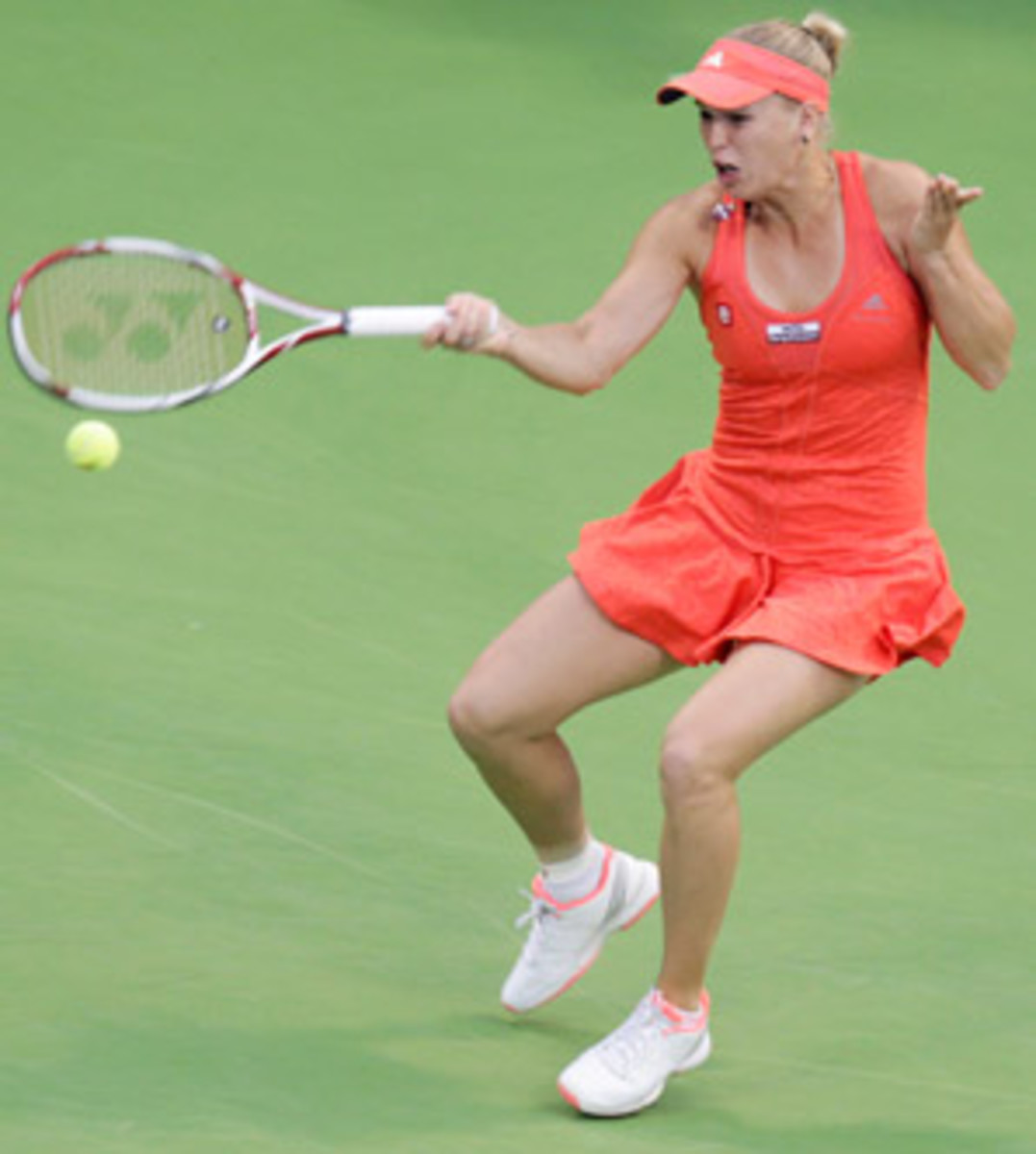Caroline Wozniacki's woes continue
Since the Australian Open, Caroline Wozniacki has fallen to No. 4 in the rankings. (Fadi Al-Assaad/ Reuters)
Second verse, same as the first.
In her first match since losing to Kim Clijsters in the Australian Open quarterfinals last month (and with it the No. 1 ranking), Caroline Wozniacki fell to Lucie Safarova 4-6, 6-4, 7-6 (3) in the second round of the Qatar Open on Wednesday.
Safarova, a hard-hitting Czech left-hander ranked 28th, has always had the firepower to blast anyone off the court, but her resolve when matches get tight has been questionable. Not this time. Safarova was down triple match point in the third set at 4-5, after already squandering a break point in the previous game. She responded with two service winners down the tee, and then another strong serve out wide to set up an eventual winner. She went on to hold and then came back from 0-2 in the tiebreaker to win the match with a heady combination of timely serves and good decision-making in knowing when to go for her shots.
While Safarova flipped the script in her ability to settle her nerves and battle back for the victory, the Wozniacki story seems to be the same as it ever was. After all the discussion about secret coaches and the interesting hiring and then quizzical firing of Ricardo Sanchez, Wozniacki is back at square one. The troubling thing is that it sounds like she's fine with it. Wozniacki has no plans to hire a new coach anytime soon, preferring the comfortable arrangement with her father, Piotr, as coach.
"For now, I’ll probably just keep it to me and my dad," Wozniacki said after firing Sanchez. "I like it when the team is not too big. It’s worked great in the past as well and for now I just want to keep it like it is."
On one hand, Wozniacki is right when she says the arrangement has "worked great." Under her father's tutelage, she sat atop the WTA rankings for more than a year and created a multimillion-dollar marketing juggernaut. Where the partnership has failed has been on the biggest stages, the majors. And I don't doubt a big reason for the less-than-desirable results at Grand Slam tournaments is Wozniacki's reliance on her father's on-court coaching, something the WTA allows but majors do not.
I tuned into her match against Safarova early in the third set. Wozniacki was down a break at 2-3 and out came Piotr, who dropped to one knee and proceeded to go into his now-familiar Polish monologue while his daughter looked like she was being scolded for the hundredth time in her life. As it has in the past, the advice worked. Wozniacki immediately broke and then held for a 4-3 lead.
It's clear that these coaching timeouts help her immensely, and unlike the other top women who also use the tactic -- Petra Kvitova, Victoria Azarenka and Maria Sharapova are known to request their coaches when things aren't going well -- Wozniacki doesn't seem to be able to play as well in tight situations when she can't call on her father. The recurring image of the world No. 1 getting a lecture from her father on the court was an embarrassing optic for the WTA last year.
At some point a player has to realize that "great" isn't always good enough. Regardless of ranking or titles or endorsement deals, shouldn't Wozniacki expect more from herself? Shouldn't she want to do everything in her power to become the best player she can be?
Azarenka had great success with Antonio Van Grichen, who helped her go from a junior to No. 6 in the world. Despite that success, Azarenka hit a wall, split with Van Grichen and hired Sam Sumyk, who coached her to her first Grand Slam title and the No. 1 ranking. Sharapova had a track record of strong results with her father, Yuri, and hitting partner-turned-coach Michael Joyce, both of whom were with her through the three Slam victories and comeback from shoulder surgery. But Sharapova realized she needed a new voice and brought in Thomas Hogstedt.
Agnieszka Radwanska was a fairly comfortable top-10 player under her father's coaching, but she has played better than ever since splitting with him last year. Even Ana Ivanovic's coaching carousel (though she now seems settled with Nigel Sears) hints at a player who is searching constantly for that elusive "thing" that will make her better. It's a leap of faith, but as Azarenka showed, the payoff is worth it.
Wozniacki just doesn't seem willing to make that leap of faith. There's a thin line between comfort and complacency, and her reversion to the incomplete and, in the context of Slams, unsuccessful reliance on her father suggests that she would rather hunker down in her shell and keep plugging along waiting for things to break her way. She appears unwilling to take a risk, bring in new voices and grab what she should feel she's entitled to. If history tells us anything, the wait-for-a-break mindset doesn't work.






